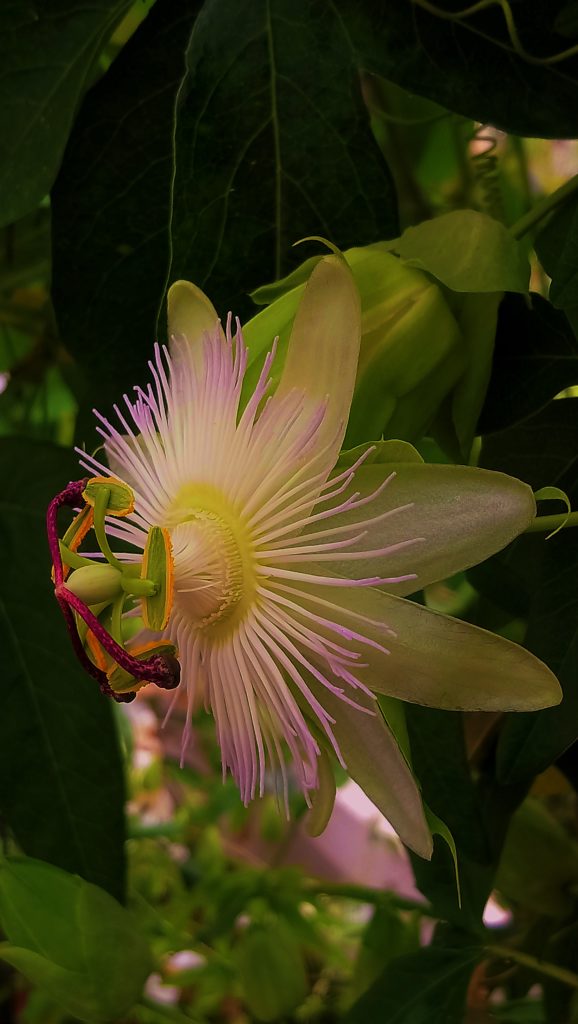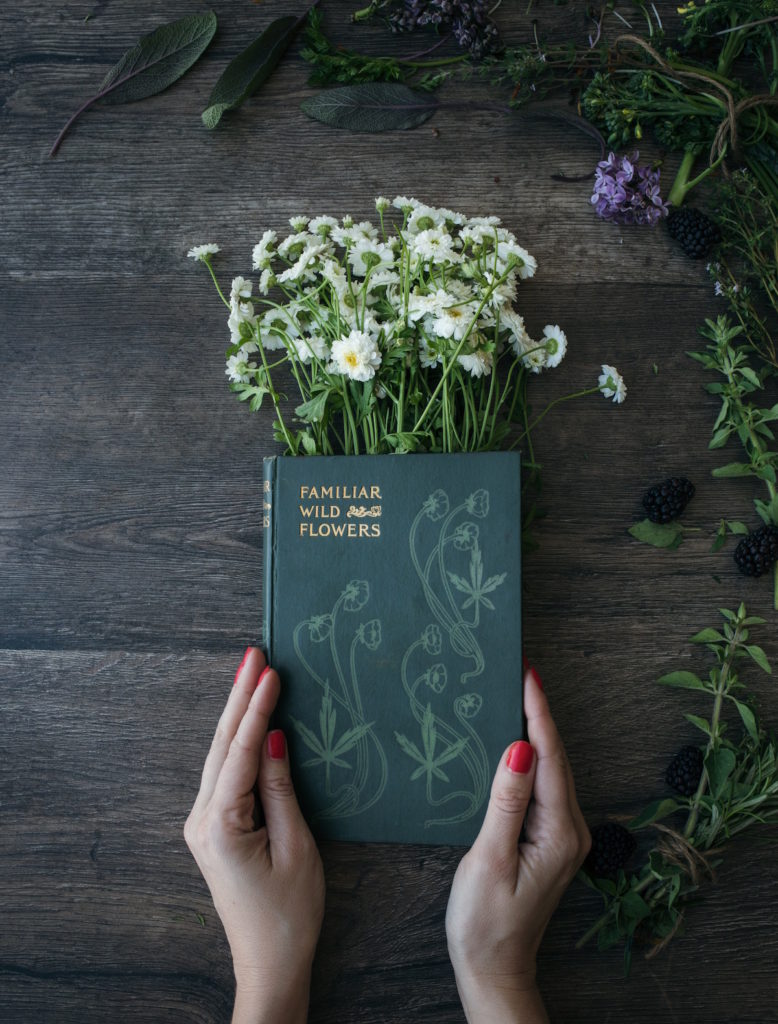My lifelong fascination with herbal medicine began at age 5, when I discovered my mother’s 1970s books on whole foods and herbalism. (Yep, my parents were still pretty much hippies when I was young, and it definitely left a mark!) I would pore over the descriptions of the plants, their healing properties, and recipes for hours. Ever since then, I’ve been drawn to wild plants and books about herbal remedies. When I travel, I love to visit the local apothecary and strike up nerdy conversations with the in-house herbalist, geeking out about awesome herbs… Heaven!
So I’ve put together some of my favorite herbal remedies for 5 common ailments, which I hope you will find as useful and effective as I do. As herbs work on a variety of different levels, and in different ways, if you’re taking any other medications, or have any medical conditions, please do consult a physician before using any of these.
Also, if you’re pregnant or due for surgery, it’s advisable to avoid using any herbs (even the gentlest), unless you check first with a qualified professional.
OK, that’s the important cautionary info out of the way, so now, let’s get on to the wonderful world of herbs!
Hay fever (Allergic reaction to dust, pollen, mold, etc)
Nettle, Peppermint and Lemon verbena tea
Although nettles cause an allergic reaction to our skin when we touch them, when used internally, they actually have anti-inflammatory and anti-allergenic effects! Nettles are full of antioxidants and minerals like calcium, iron, and magnesium. If you’re picking your own, make sure to:
- wear thick gloves,
- only pick the small new leaves near the tops of the stem,
- avoid picking the leaves when the plant is in flower (these can aggravate the gut).
Peppermint leaves are aromatic, delicious, and known to help with digestion. One of peppermint leaf’s other uses is as a gentle decongestant. Its cooling properties tame irritated sinuses.
Lemon verbena has a lovely calming quality that works well for asthma, cold, and flu symptoms. It tastes fresh and lemony, and has a really uplifting, gentle, relaxing effect.
These three herbs are usually easy to find at reputable herbalist stores. When combined in equal measure, they make for a gentle, slightly earthy, refreshing, relaxing, and soothing tea. Drink it to alleviate the irritation of hay fever and calm the constant sneezing and itchy, sore eyes. To prepare, simply mix the three dried herbs together, then add two heaped teaspoons of the mixture to a teapot or infuser, pour on recently boiled water, put on the lid (to keep all those lovely volatile compounds in there), and infuse for 5-10 minutes. Then pour through a tea strainer into your favorite cup, and enjoy!
Hangover
Most of us have probably been there once or twice, and let’s be honest, it’s not fun—for us or our livers. Milk thistle was traditionally used to help liver and gall bladder problems, and it’s still used as a liver tonic today. Some studies suggest that milk thistle’s fruit may also protect the liver from damage, and may even help it to regenerate! So this is a super hero herb to take before and after your big night-out. Your liver will thank you for the extra help! Milk thistle can be found in some pre-prepared herbal teas, as well as in capsule form. Dr. Stuart’s Liver Detox tea is one of my firm favorites, not only for hangovers, but also in the run up to my menstruation, as it helps the liver to process all those hormones.
For nausea and general run-down-ness, ginger tea is always good (peel, chop and boil ginger root in a pan, for 30 minutes to an hour). Or try ginger juice mixed with a little water and your favorite sweetener. Ginger is magic at helping folks feel a bit more human and ready to face the world. It also brings down fever, reduces nausea, and boosts resilience.
Thyme has been a remedy for hangovers since ancient times, and it helps lift the spirits, relieves chills and lethargy, stimulates digestion and peps up the appetite. Making an infusion of thyme with the leaves and flowers releases the essential oils and flavonoid compounds. So get out that teapot and put the kettle on!

Passionflower – not just a weird alien-looking plant, it’s great for anxiety and insomnia as well!
Stress and Anxiety
One of the most bizarre and alien-looking flowers I’ve ever seen, Passionflower is native to North America, and has a whole list of uses. Take it alongside herbs like hops and valerian to improve your quality of sleep. You can also use passionflower leaves to relieve anxiety.
Passionflower can in some rare cases cause drowsiness, so avoid taking it before driving or with other sedative medication.
To make passionflower tea, steep 1-2 teaspoons of dried passionflower leaves in hot water for 5-10 minutes, and sweeten if you prefer.
Lavender essential oil (relaxing) and geranium essential oil (uplifting) are both mood-boosting lifesavers for stressful times or if you’re feeling blue. For a lovely room spray, pop 5–10 drops into a spray bottle full of water and spritz around the room you’re in. Use an oil diffuser, or put a few drops into a hot bath and swirl the water around to mix it up, and soak that stress away in aromatherapeutic bliss. If you suffer from insomnia, 3–4 drops of lavender oil on a cloth or handkerchief and placed on your pillow can have you nodding off to sleep in no time—for real. Essential oils are generally effective for up to 2 weeks when used regularly. But can become less effective if used for too long, so I usually switch between remedies to keep them effective.
Tiredness/lack of energy
Ashwaganda is one of those magical herbs called adaptogens. During times of stress, threats to its survival or tough growing conditions, the plant has developed nifty compounds which have helped it to adapt to these conditions and survive. By a beautiful synergy, adaptogens can also help us humans to cope with stress, including emotional stress. Mother nature, we salute you!
Ashwaganda is one of the most prominent herbs in the Ayurvedic tradition, and has a myriad of benefits, including rejuvenation. It’s not known as Indian Ginseng for nothing! It helps the body to cope with stress and soothes the mind. Ashwaganda is available in a variety of different forms, such as yummy herbal lattes (Cacao Maca Magic, and Night Time Organic latte, by Pukka), herbal capsules and in powder form, which can be added to smoothies, dishes and baking.
Coughs, Colds and Sniffles
If you have a sore throat, marshmallow soothes itchy and irritated mucous membranes, coating and calming them.
Marshmallow comes in a variety of forms:
Dried root: steep 1-2 teaspoons overnight per cup of cold water to release its properties, then strain and drink, up to three times a day.
Dried powdered root: blend 1 teaspoon of dried powdered marshmallow root with water, and swallow it.
Dried leaves or flowers: make an infusion of 2 teaspoons of the leaves or flowers per cup, with just off-the-boil water, and drink 2-3 times per day.
To ease congestion, you could try a steam treatment. Pour boiling water into a basin, drop in 3-4 drops of eucalyptus essential oil, and sit with your head over the bowl (preferably over a table) and a towel over your head and the bowl, to keep in the steam, and breathe deeply, for as long as you can. Don’t forget to close your eyes though!
Garlic: to battle the bug—traditionally used against respiratory, skin and digestive infections. Garlic is a powerful anti-microbial. It’s even effective against the “super bug” Staphylococcus aureus which is resistant to most antibiotics—killing 90% of the bacteria.
Garlic is best used raw, as heat breaks down many of its useful medicinal compounds. If you don’t fancy noshing down on a bulb of garlic, try making a lovely vegan aioli or pesto for your salad or pasta.
Elderberry: pre-emptive strike at the first tickle! Studies have shown that elderberry can prevent viruses from becoming established, by stopping them attaching to your airways. One study found that taking elderberry healed flu symptoms 4 days earlier than taking placebo. Elderberry extract is available in many different forms, such as capsule, tea and fizzy tablets. But if you have a local elder tree, try making your own elderberry vinegar, using cider or white wine vinegar, elderberries and muscovado sugar (or your own choice of sweetener).
__
Photo: Heather Barnes via Unsplash; Ema





